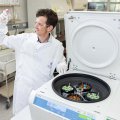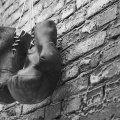Anthropologist documents PNG village life
Anthropologist Garrick Hitchcock's links with a remote village in the swampy lowlands of south-western Papua New Guinea (PNG) are likely to last much longer than his PhD research.
He has been to Wando in PNG's Western Province four times since 1995 and lived with the people for up to a year at a time - joining in their hunting, fishing and gardening and studying their history and culture. They call him Narthum and have helped him build his own traditional paperbark house.
Their concerns have become his, he says, including a need for water tanks for the Wando Community Primary School - a project he's been seeking contributions for during the past 10 months he's been back in Australia working on his thesis.
"The area looks very much like the Kakadu wetlands," he said.
"In the wet season, the lowlands flood and people live on ?islands' of higher ground, travelling between villages by canoe.
"But drought becomes a real problem in the dry season, and in particularly dry years like 1997 people have to travel many kilometres in search of drinking water."
Mr Hitchcock has gathered a wealth of historic, environmental and cultural data as oral history and by observation, and rounded it out with archival research in Australia and Papua New Guinea - work he hopes to extend to museums in the U.S., U.K. and the Netherlands.
His field work has also turned up two Australian native species previously undocumented in PNG - the False Water-rat (Xeromys myoides), classified as rare in Australia, and the Spectacled Hare-Wallaby (Lagorchestes conspicillatus).
"The biggest problem with my thesis is deciding what to focus on and what to leave out - there's just so much of interest," he said.
His research centres on how the people interact with their environment and how their culture has adapted following contact with the modern world.
"This society first experienced contact with Europeans early this century, and even today interaction with the cash economy is very limited," he said.
"Many ancient traditions have survived, such as the use of bamboo bows for hunting pigs, wallabies and other animals although there are a couple of shotguns in the village.
"The area is very remote and undeveloped, with a lack of government services such as water, roads and health.
The only major economic venture is the Bensbach Wildlife Lodge, a small-scale tourist operation established by Australian businessmen in 1975."
Wando, population 100, lies in swampy lowlands by the Torassi River - one of the last coastal PNG rivers known to Europeans when an Anglo-Dutch expedition came upon it in 1893.
The group was led by the Lieutenant Governor of British New Guinea, Sir William MacGregor, who later became Queensland Governor and Chancellor of the University of Queensland. He named the river the Bensbach, after a Dutch colonial official.
Today the river mouth marks the border with Irian Jaya, so Indonesian influences have filtered through from transmigrant camps on the border, according to Mr Hitchcock.
"Illegal hunting and fishing by Indonesians on the PNG side is a real problem, and they have also affected the environment through the introduction of Asian pest species such as the air-breathing fish Climbing Perch (Anabas testudineus) which feeds on the native fish," he said.
The potential impact of these developments is also discussed in his thesis.
The Torassi River was part of the Tonda Wildlife Management Area (WMA), designated a wetland of international importance under the Ramsar Treaty in 1993, he said.
"The World Wide Fund for Nature and AusAID are planning projects to help the people protect their environments by training them to manage threats such as introduced species and unsustainable development," he said, "and I hope to be involved with these projects next year."
Mr Hitchcock's thesis had its genesis in a 1995 meeting with Dr Budai Tapari, head of the University of Papua New Guinea's Geography Department, an initiated Bensbach elder whose family lives in Wando.
The two were introduced by Dr Tapari's friend and Mr Hitchcock's PhD supervisor, Dr David Hyndman of the University of Queensland's Anthropology and Sociology Department. The PhD project has became a collaborative effort with Dr Tapari, who returns to his home village every year during the Christmas holidays.
"Travelling and working with Dr Tapari has been a terrific experience." Mr Hitchcock said.
"He has a detailed knowledge of the local culture, history and environment, and together with his family has provided a tremendous amount of support in the field."
Mr Hitchcock will make his fifth visit to Wando next year to work on the next stage of his research - and the school's new water tanks. The $2000 return trip involves a jet aircraft flight to Port Moresby, then flights in a twin-engine aircraft to Daru, the capital of Western Province, and a smaller aircraft to the Bensbach Wildlife Lodge, the nearest point to his "second home".
For more information, contact Garrick Hitchcock (telephone 3227 6490 or 3343 4164).



